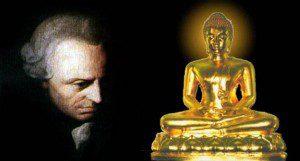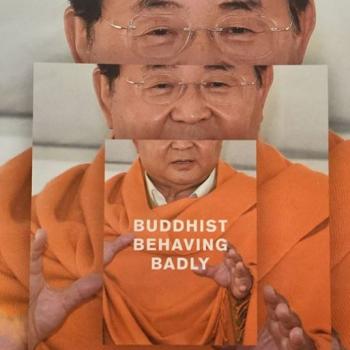One conception was common to all the philosophical schools: people are unhappy because they are the slave of their passions. In other words, they are unhappy because they desire things they may not be able to obtain, since they are exterior, alien, and superfluous to them. It follows that happiness consists in independence, freedom, and autonomy. In other words, happiness is the return to the essential: that which is truly “ourselves,” and which depends on
us.
– Pierre Hadot, Philosophy as a Way of Life, p.102, writing about ancient Western schools, emphasis added.

It has been a running theme of this blog, and my studies for over a decade now, to examine the fundamental theme of the human search for happiness. The word ‘happiness’ has become a bit abused in recent decades, much like ‘spiritual’, but it can perhaps still be saved if we keep asking: what does it really mean to be happy? The happiness industry has its answers, mostly revolving around ‘think happy = be happy’; consumerist society has its ideas, mostly, unsurprisingly, revolving around buying things. And philosophy – including Buddhism in this case – has its answers as well. To borrow again from Hadot:
The practice of spiritual exercises implied a complete reversal of received ideas: one was to renounce the false values of wealth, honors, and pleasures, and turn towards the true values of virtue, contemplation, a simple life-style, and the simple happiness of existing.
And, finally, before moving on to my own thoughts (emphasis added),
…the Stoics did attach a great deal of importance to words, and carefully distinguished between hedone – “pleasure” – and eupatheia – “joy”.”… they refuse to introduce the principle of pleasure into moral life. For them, happiness does not consist in pleasure, but in virtue itself, which is its own reward. Long before Kant, the Stoics strove jealously to preserve the purity of intention of the moral consciousness.
For Kant, in many ways following the Stoics, happiness is something we make ourselves worthy of by following the moral law. That moral law, importantly (and oft misunderstood) is not something ‘out there’ – as in religious or political laws or rules. The moral law comes from us. But it is also not subjective, it is objective (and universal) because it is based in what we all share as humans: reason. Reason for Kant is a term of art. It isn’t used as we use it today, in the instrumental sense: ‘he reasoned his way through the situation,’ or ‘accountants are very reason-based people.’ There, reason can be replaced by ‘calculate’.
In Kant, reason is the faculty which takes us beyond ourselves as subjective, limited beings. It is what compels us to do the right thing even when we cannot explain this to others. It is the faculty by which people saw that slavery was wrong even when religion and politics sanctioned it. It is the faculty through which we see the dignity and irreducible value of every other human being (and, some would say that it eventually reaches to non-human animals as well).
You can see why Kant is so easily and often misunderstood. It is easy to read him without understanding his use of terms.
In any case, that is Kant on Reason (in a nutshell). By employing our reason we learn to see things from others’ perspectives, we learn to see the good and dignity in others, in short, we quit being so selfish. For Kant it is our selfishness, and our selfish use of reason (here as mere calculation) that is the main cause of suffering in the world. The second cause of suffering is merely following the dictates of others. (read his popular essay on the topic, What is Enlightenment, here)
The ‘good Christian’ for Kant was the one who, using his reason, determined that there must be a God and that one really ought to act for the benefit of all people as much as possible, utterly regardless of whether this will bring you benefit or not. A good Christian was not one who worked to please or impress the priests or fellow parishioners or to merely master the dogma.
Similarly, a good citizen realizes, through his or her reason, the importance of a flourishing and stable society and the danger of revolution. The good citizen is not the one who carefully or mindlessly follows political rules. Sure, impressing people and following rules have their place, but for Kant, doing the right thing (morality) would always trump either of these – and morality is the proper aim of all of us.
It is in this fathom-long carcass, (which is) cognitive and endowed with mind, that, I declare (lies) the world, and the origin of the world, and the stopping of the world [nirvana], and the way that goes to the stopping of the world (S.I.62). {in Harvey, p.75}
Harvey comments on this thus:
Within the confining parameters set by a certain meaning-world, one has some freedom of action in accordance with one’s degree of awareness and reflection. A more full and accurate meaning-world, closer to seeing things as-they-really-are and thus less affected by ignorance, opens up new possibilities, which are closer to the experience of nirvaana-the unconditioned (asankhata).
My Kantian-Buddhist angle on this would say that our degree of awareness and reflection can be understood as analogous to Kant’s use of Reason (in the non-calculative sense). The more irrational we are, the more we are slaves to a very narrow meaning-world, generally determined by our religion or political persuasion and the people we have regular contact with. Our use of reason (generating awareness) allows us to rise above this, giving us a ‘more full and accurate meaning-world.’
Our suffering is so much a result of our concepts – our attempts to box in the world and make it predictable. And where do we get these concepts? From other people and social, political, and religious institutions.
But this is not to deny the importance of institutions and other people. We need both of these. The problem only arises when institutions and people claim to give us some sort of certainty, or we seek certainty in them. This is a problem because change or flux is fundamental to reality. And flux (anicca) is fundamental to seeing-things-as-they-really-are (yatha-bhuta).
Nirvana, it would seem, is the fullest acceptance of flux – or fullest recognition thereof. It is a rising above the happy-one-moment, sad-the-next that dominates samsaric existence. This is a true happiness, one unconditioned by the vicissitudes of daily life, one which runs much deeper.
So for both Kant and Buddha it seems that happiness is a result of disentangling ourselves with the ways of the world around us in search of something deeper. This ‘something deeper’ was for Kant the ‘moral law’ and for Buddha the Dharma.
For both this was the goal of a good life. For both, bad things could still happen – living morally or according to Dharma is no guarantee that things will be just fine from that time forward. The Buddha still had to confront angry elephants, a serial killer (Angulimala), and his jealous and murderous cousin Devadata. In recognizing this, Kant was quite clear that living a moral life is no guarantee of happiness – stuff will still happen – but it does guarantee that we are worthy of happiness, that is, we can rise above the stuff as it assails us.
Through this, we can better read some of the contemporary debates about happiness, which today is an industry in itself. It’s okay, I think, to seek happiness or want happiness in life, as long as one knows what kind of happiness is attainable and how to attain it. It’s not a matter of ‘getting something’ (wife, car, kids, retirement, etc) and then being happy. Happiness is a bi-product of living well, whether that is through the cultivation required in the Buddha’s 8-fold path or the kind of intellectual and moral progress advocated by Kant. So long as you understand that, you can seek happiness in the correct way.
Further Reading:
Peter Harvey’s article on Free Will [here].











